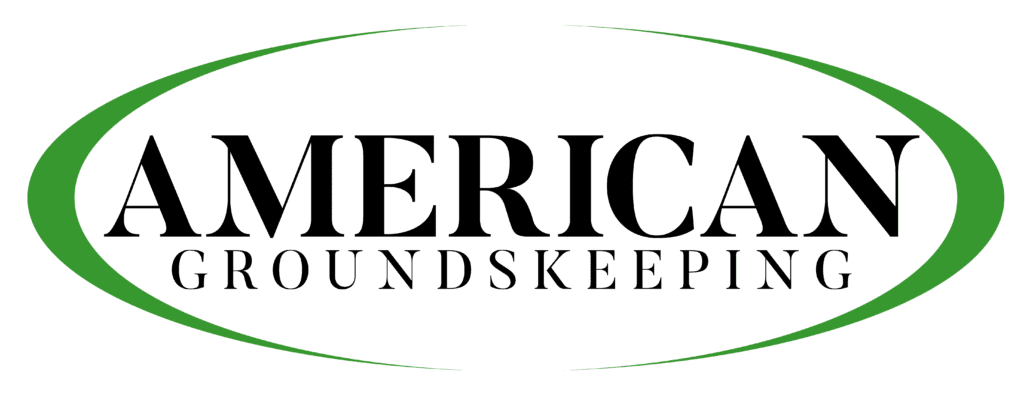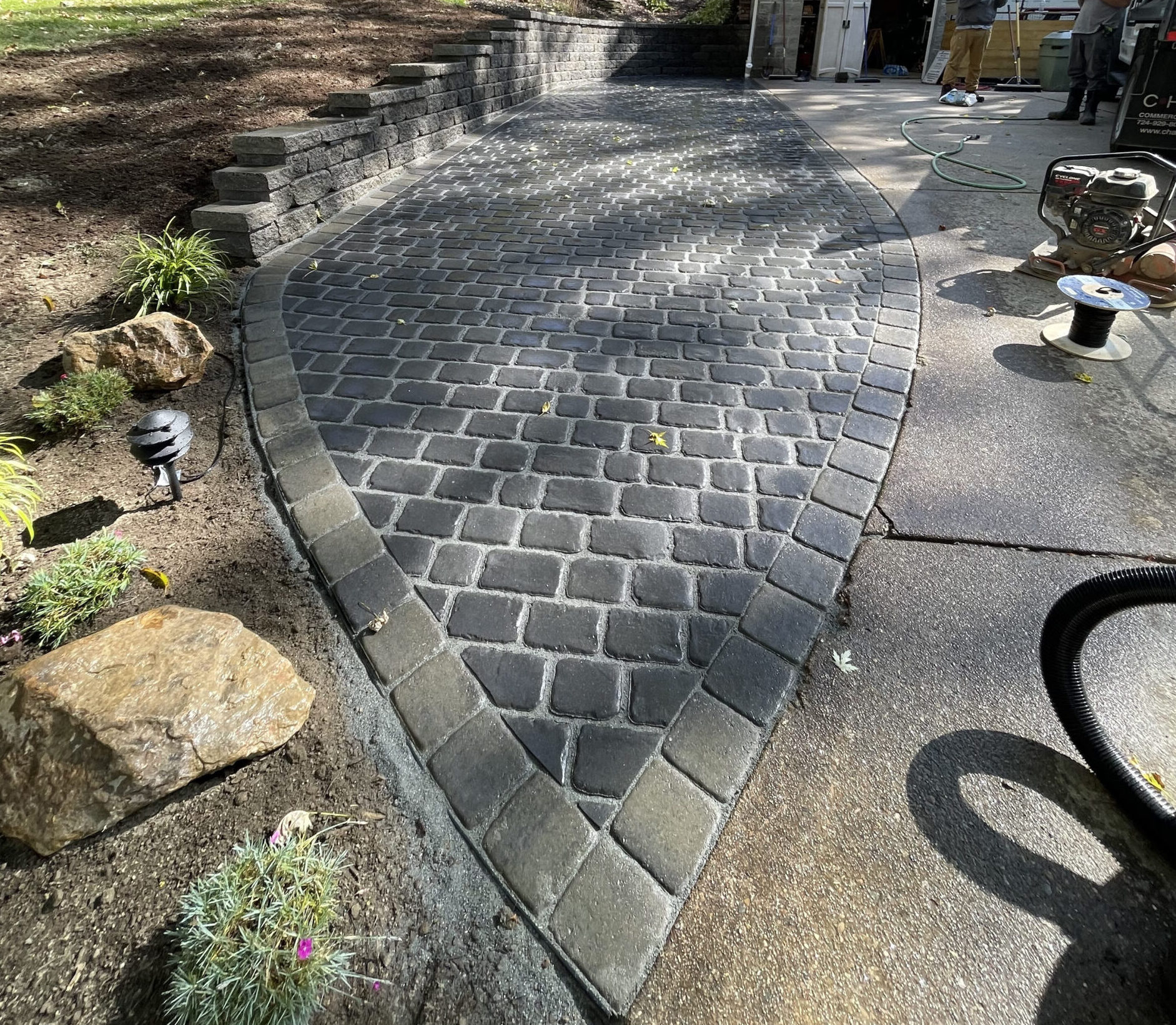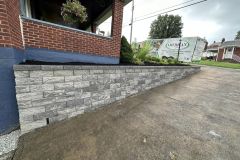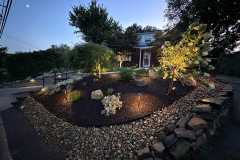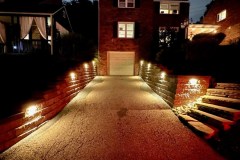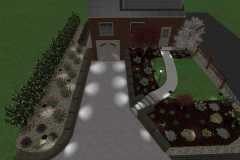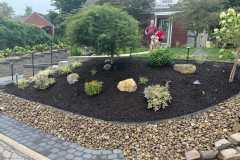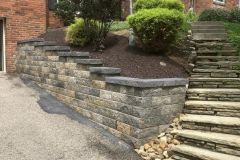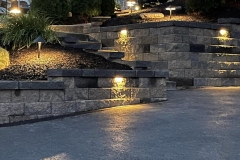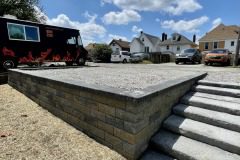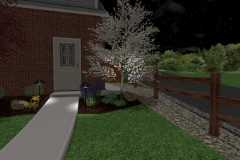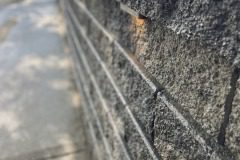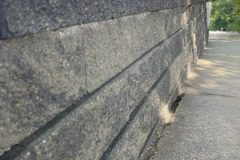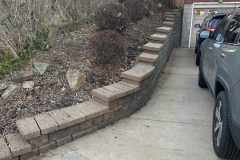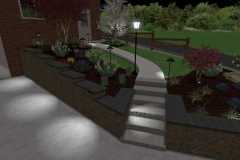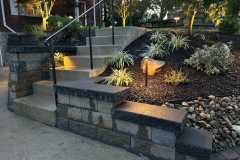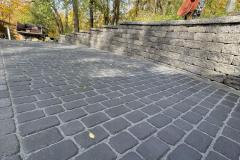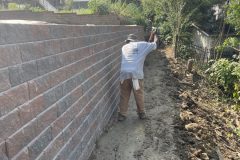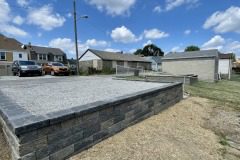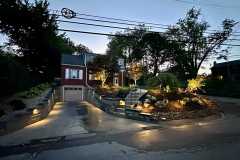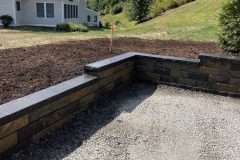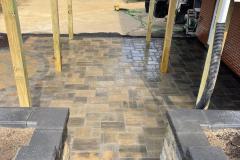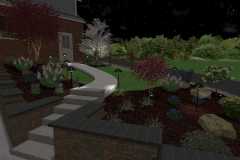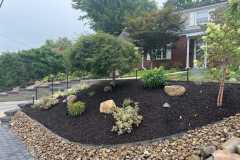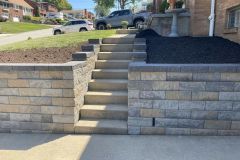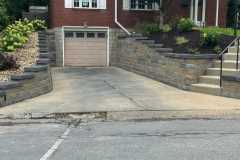Retaining walls play a crucial role in protecting against soil erosion and retaining soil, especially in areas with slopes. In the Pittsburgh area, these walls can also pose a safety hazard if not properly designed and constructed. This is why building codes require that walls over 4 feet tall must be designed by a qualified engineer. In this blog post, we will discuss the reasoning behind this requirement, the importance of following local building codes, and how to find the right engineer for your retaining wall project. We will also highlight the importance of retaining walls in the Pittsburgh area and how American Groundskeeping works with engineers to build stylish and functional retaining walls with the help of trusted manufacturers such as Redi Rock and R.I. Lampus.
Why Are Engineering Standards Required for Tall Retaining Walls?
Retaining walls are used to hold back soil, rock, or other materials. When the height of the wall exceeds 4 feet, the wall is considered to be “structural” and must meet certain engineering standards to ensure its stability, safety, and ability to withstand the forces exerted on it by the soil and other materials it holds back. These standards include calculations for the wall’s load-bearing capacity, the materials used in construction, and the method of construction. It is important to note that in the Pittsburgh area, retaining walls are especially important due to the hilly and sloped terrain. Retaining walls help prevent soil erosion and landslides, protect against flooding, and even add aesthetic value to your landscape.
One of the key factors in the stability and safety of a retaining wall is the load-bearing capacity of the materials used in its construction. These materials must be able to withstand the forces exerted on the wall by the soil and other materials it holds back, as well as the weight of the wall itself. Engineers use calculations to determine the load-bearing capacity of the materials and design the wall accordingly. This ensures that the wall is able to withstand the forces exerted on it without collapsing or shifting.
Another important aspect of retaining wall design is the method of construction. Engineers must take into account the type of soil and the slope of the land when determining the best method of construction for a retaining wall. For example, in areas with loose or wet soil, a different construction method may be necessary than in areas with dry, compact soil. Engineers also take into account the height and length of the wall, as well as the materials used, to ensure that the wall is stable and able to withstand the forces exerted on it.
The Importance of Following Local Building Codes
Building codes are set at the local level and are based on national model codes such as the International Building Code (IBC) or the International Residential Code (IRC). These codes provide the minimum requirements for the design and construction of retaining walls. It is important to follow these codes to ensure that the wall is safe and able to withstand the forces exerted on it by the soil and other materials it holds back. Additionally, taller retaining walls may require permits and inspections by local building officials to ensure that they meet all safety and zoning requirements. In the Pittsburgh area, it is important to check with the local code enforcement to ensure that your retaining wall meets all necessary codes and regulations.
By following these codes, homeowners can ensure that their retaining walls are safe and stable. Failure to follow building codes can lead to a number of problems, including collapse, shifting, and failure of the wall to hold back the soil and other materials it is designed to retain. This can lead to serious safety hazards and costly repairs.
How to Find the Right Engineer for Your Retaining Wall Project
Choosing the right engineer is crucial for ensuring that your retaining wall is designed and constructed to meet the necessary engineering standards and local building codes. When searching for an engineer, it is important to look for one who is licensed and has experience designing retaining walls. Ask for references and check the engineer’s qualifications, including their education and experience. It is also important to ensure that the engineer has a good understanding of the local soil conditions and the specific requirements of your project.
One way to find a qualified engineer is to ask for recommendations from friends, family, or other professionals in the industry. You can also check with local engineering associations or professional organizations to find a list of licensed engineers in your area. Additionally, many engineering firms have websites that provide information about their qualifications and experience, making it easier to find the right engineer for your project.
Another important factor to consider when choosing an engineer is their experience with retaining walls. Engineers who specialize in retaining walls will have a better understanding of the specific requirements and engineering standards that apply to these types of projects. They will also have a better understanding of the local soil conditions and other factors that can affect the stability and safety of a retaining wall.
Retaining Wall Solutions from Trusted Manufacturers
American Groundskeeping works with trusted manufacturers such as Redi Rock and R.I. Lampus to provide engineered solutions for retaining walls over 4ft or higher. Redi Rock is a trusted manufacturer of engineered concrete stone, with blocks that are 41″x 46″ x 18″ and weigh between 1 ton to 3500 pounds. These blocks require an excavator for installation and use a revolution positivity connection system. Redi Rock is a proven solution and engineers and architects have been designing walls around the world with Redi Rock since 2000.
R.I. Lampus also provides manufactured retaining wall block that can be used in engineered wall applications with the use of Geogrid, a geosynthetic material that adds to or enhances the functions of conventional materials to make construction more efficient, cost-effective, and reliable. R.I. Lampus offers Biaxial and multi-axial geogrids for stabilization and filtration, and Uniaxial geogrids for reinforcement. They also offer asphalt interlayers for reinforcement and/or waterproofing. This allows American Groundskeeping to provide a variety of engineered solutions to fit the specific needs of each project and ensure that the retaining wall is safe, stable, and able to withstand the forces exerted on it.
Benefits From Reputable Manufacturers
American Groundskeeping benefits from reputable manufacturers such as Tensar for their geogrid solutions by using R.I. Lampus as their block manufacturing, Tensar offers Biaxial and multi-axial geogrids such as TriAx that provide additional diagonal ribs for increased in-plane stiffness and better interlock with the surrounding aggregate. They also have a product called GlasPave Mat, a geosynthetic, non-woven polyester matrix that limits the infiltration of surface moisture into the granular layers of a pavement structure and promotes a quick, strong bond with a variety of asphaltic tack coats. All these solutions ensure that the retaining wall is safe, stable, and able to withstand the forces exerted on it.
Retaining Walls Over 4 Feet Tall Play a Crucial Role
Retaining walls over 4 feet tall play a crucial role in protecting against soil erosion and retaining soil, especially in areas with slopes. In the Pittsburgh area, these walls can also pose a safety hazard if not properly designed and constructed. That’s why building codes require that walls over 4 feet tall must be designed by a qualified engineer. By following local building codes, finding the right engineer, ensuring that your retaining wall meets all necessary engineering standards, and working with trusted manufacturers such as Redi Rock, R.I. Lampus, and Tensar, you can ensure that your retaining wall is stable, safe, and able to withstand the forces exerted on it. American Groundskeeping works with engineers in the Pittsburgh area to build stylish and functional retaining walls that meet all necessary codes and regulations, providing an engineered solution that fits the specific of each project. To ensure that your retaining wall is safe, stable, and able to withstand the forces exerted on it, it is important to work with a reputable company like American Groundskeeping that has the experience, knowledge, and resources to provide an engineered solution that meets all necessary codes and regulations.
In addition to meeting all necessary codes and regulations, American Groundskeeping also focuses on providing retaining walls that are stylish and functional. The company works with architects and designers to create retaining walls that not only meet all necessary engineering standards but also complement the overall look and feel of your landscape. They use a variety of materials and designs to create retaining walls that are not only functional but also visually appealing.
By working with American Groundskeeping and having access to a team of engineers, architects, and designers, homeowners can rest assured that their retaining walls will not only meet all necessary codes and regulations but also add aesthetic value to their property. With the help of trusted manufacturers such as Redi Rock, R.I. Lampus, and Tensar, American Groundskeeping provides engineered solutions that are safe, stable, and able to withstand the forces exerted on them.
Conclusion: Retaining Walls Over 4 Feet Tall are an Important Aspect of Protecting Against Soil Erosion
In conclusion, retaining walls over 4 feet tall are an important aspect of protecting against soil erosion and retaining soil, especially in areas with slopes, like in the Pittsburgh area. Building codes require that walls over 4 feet tall must be designed by a qualified engineer. By following local building codes, finding the right engineer and ensuring that your retaining wall meets all necessary engineering standards, you can ensure that your retaining wall is stable, safe, and able to withstand the forces exerted on it. American Groundskeeping works with engineers in the Pittsburgh area to build stylish and functional retaining walls that meet all necessary codes and regulations, providing an engineered solution that fits the specific needs of each project. With the help of trusted manufacturers such as Redi Rock, R.I. Lampus, and Tensar, American Groundskeeping ensures that the retaining wall is safe, stable, and able to withstand the forces exerted on it.
